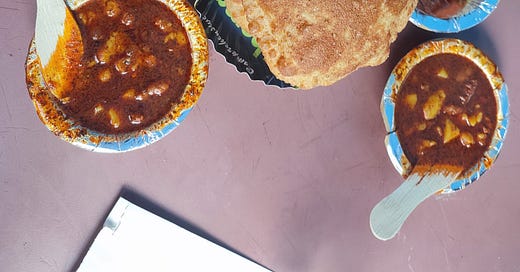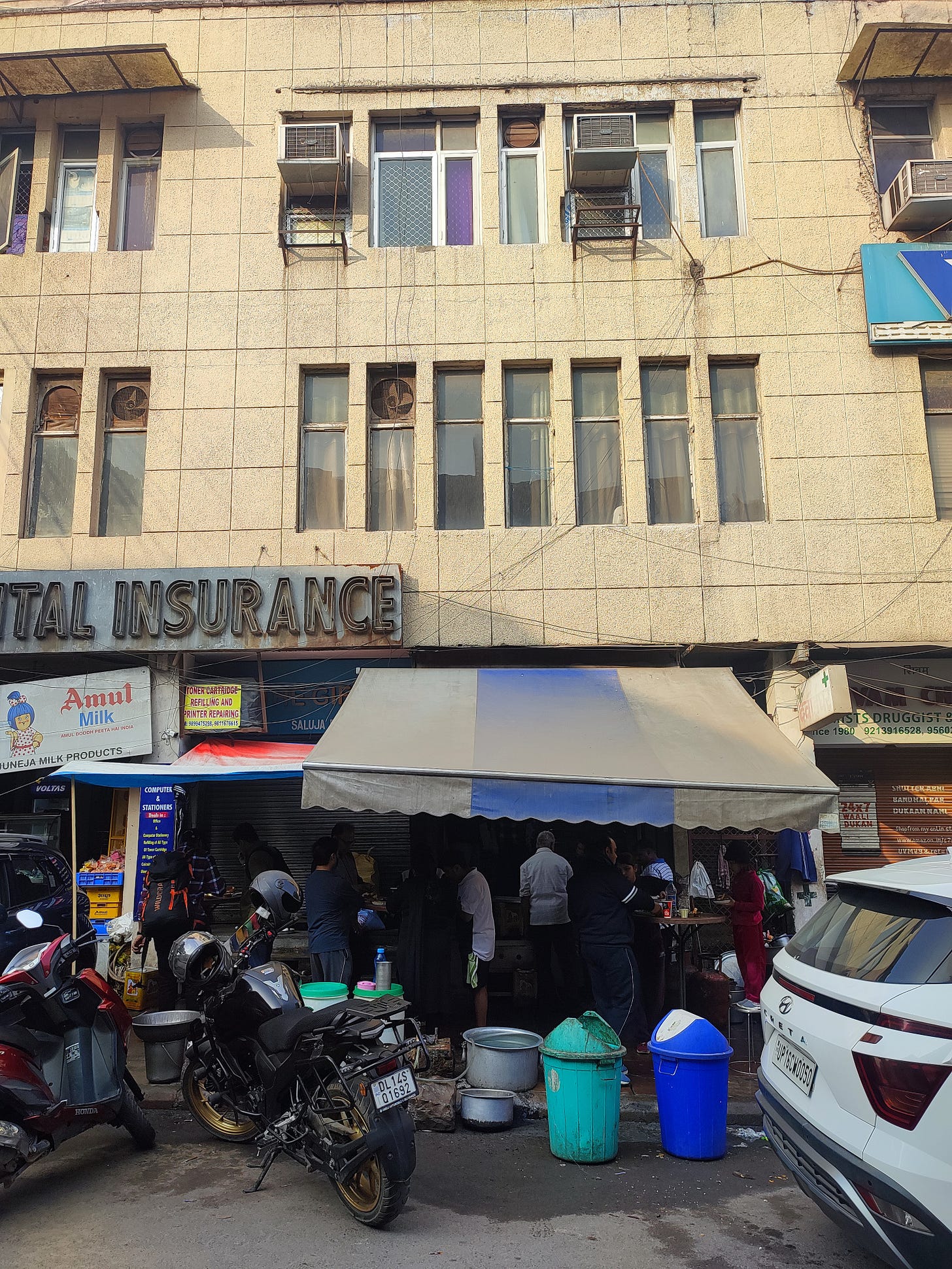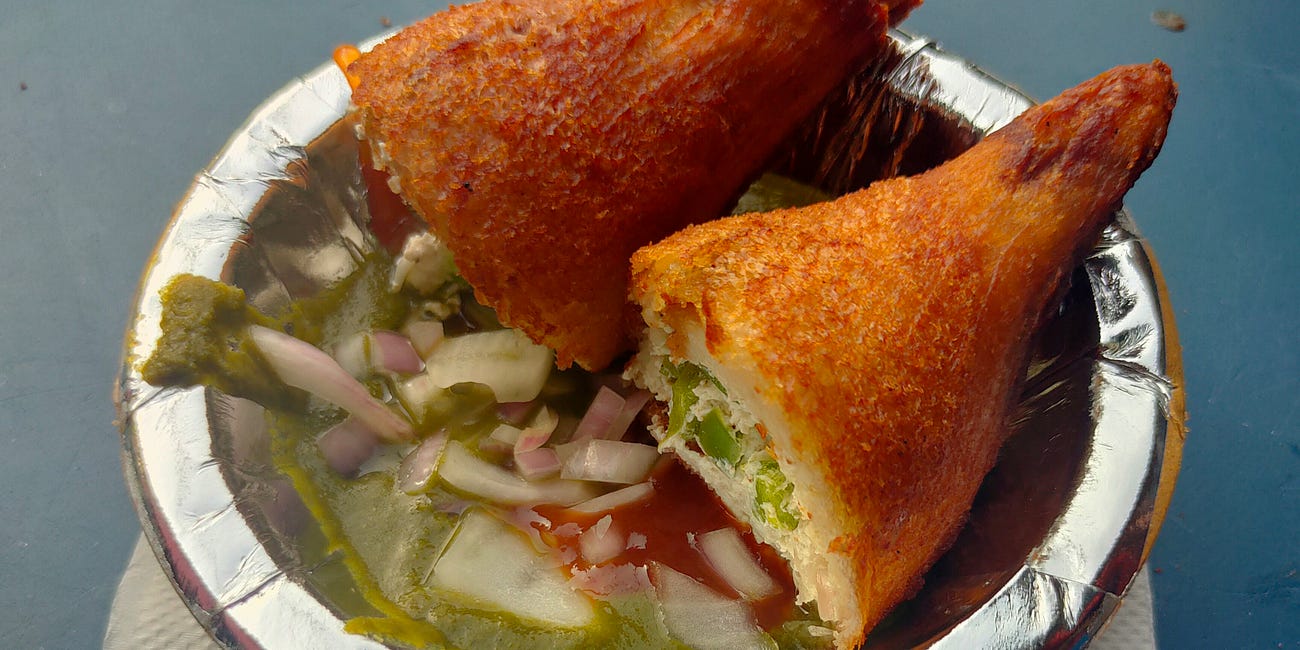A tale of Breakfast, Migration and Cricket - Sardar Ji Poori Wale on Ansari Road in Daryaganj
The food of Dilli is the food of its migrants. And the history of Dilli is the history of migration. If one wants to understand this history, they need not pick up a textbook. A mere glimpse at a list of the most popular foods of Dilli shall suffice. The now-ubiquitous Momo was originally introduced by Tibetan refugees in the mid-1990s. Most Chhole Bhatuure vendors, such as Banshi di Hatti in Malka Ganj, are of West Punjabi origin. Kundan Lal Gujral brought Tandoori Chicken with him to the Moti Mahal in Daryaganj from Peshawar, which he used as a base to invent the Butter Chicken that is now synonymous with all things Dilli.
And two lanes from the Netaji Subhash Marg in Daryaganj, where Gujral’s shop is situated, there lies the Ansari Road, known for being home to a plethora of publishing houses, home to an unnamed, hole-in-the-wall sweet shop that is colloquially known as “Sardar Ji Poori Wale”, serving the local community since 1947. Of course, the year of its establishment is no surprise to us. 1947 was the year of the partition, and it caused a major shift in the demographics of Dilli, as millions of Hindu and Sikh Punjabi refugees left their homes in Lahore and Peshawar and elsewhere, headed eastwards in search for a new home, which would come to be Dilli for many of them.
The owners of the shop in question are originally from Rawalpindi. When they came to Dilli, they set up shop with a simple menu. They sold Aloo-Poori for breakfast, followed by Rajma Chawal for lunch, and Samosa-Jalebi in the evening. This formula has remained unchanged till date. My solitary visit to this place was in the morning before the third Day of the Test match at the Feroz Shah Kotla during the 2023 Border-Gavaskar Series, which I feel is important to mention for a couple of reasons. To start off, I had witnessed two very good innings from batters I am extremely fond of - Pujara hitting the winning runs in his 100th Test that evening, and a masterclass in combating spin by Virat Kohli the day before. Secondly, this haunt is the closest breakfast spot to the Kotla that I know of, and I absolutely recommend all match-goers to go visit this spot for a filling dose of aloo-puri before they depart for the stadium, given how terrible and expensive food inside the stadium tends to be, as well as the fact that Indian stadium experience, especially poorly constructed ones like the Kotla, tend to be draining, both for the body and the mind. But most importantly, this means that I’ll really only be reviewing their Aloo-Poori. Readers are highly encouraged to sample other dishes as well.
Now, I may ruffle a few feathers with this, but I’ve never been a big fan of Chhole - Bhatuure. The bread is too heavy, and while I enjoy having a well-cooked and seasoned chhole, in larger quantities (anything more than a couple of bites), it becomes a tad unpleasant for me. I have always maintained that the superior breakfast to be found in Dilli (apart from Nihari, of course) is Bedmi Poori with Aloo ki Sabzi, and what this shop has to offer only further proves my point. Their pooris, made of urad dal and flattened by hand, are deep-fried in oil till they reach a wonderful soft texture, ensuring they have a taste of their own and that they’re not too heavy on the stomach. It is served with an aloo sabzi flavoured with dhaniya, red chilli powder and heaps of garam masala, which gives it an extremely strong flavour as well as its distinctive, dark - brown colour. The sabzi has small pakoris of besan and urad dal in it as well, which help to break up the texture of the potatoes.
Having travelled all the way to Old Dilli to have this, the satisfaction I get once the intense flavours of the sabzi hit my mouth is reminiscent of watching Virat Kohli tussle with the Australian bowlers with his passive defensive stroke-play for a couple of balls, before finally unleashing a perfectly-timed cover drive that passes the fielder and goes for four, and the uncouth manner in which I gorge down the poori-sabzi is no less than Kohli’s onslaught on the English attack in Edgbaston in 2018. Have their pickle of carrot and chillies on the side and forget about the Test match that you’re about to witness. The only contest between bat and ball that will matter in the moment is the tussle between your tummy and your tongue, one insisting it can take in more of this irresistible combination, while the other begs to stop, as it is full to the brim.
But think once again of Virat Kohli. This is a man who came to call the Kotla his homeground in domestic cricket, a base from where he was to conquer the world, leaving no stone unturned. There is no greater marker of his brilliance than the fact that the pavilion of the Kotla was named after him while he still had an active career. The shop in Daryaganj is only a kilometre away from the Virat Kohli Pavillion in the Kotla. One may think that there is nothing much that unites the two. But there is a city seven hundred and forty one kilometres away that does so. This city is Rawalpindi in erstwhile Pakistan - where Kohli’s ancestors migrated from post-partition, just as our lovely shop-owners did. It may be surreal to think that a city in far-off Pakistan is what unites one of the greatest to ever grace the game with our little undescript shop. But after all, a story of Dilli is never complete without a tale of migration.
Recommendations : Aloo - Poori (9.25 / 10)
Timings : 0830 - 1230
Location : 23/23, Emica House, Ansari Road, Darya Ganj, Delhi - 110002 (Bank Of India)
The exact address may be inaccurate. But the google maps location should work perfectly.
Dahi Ke Sholay at Pandit Ram Sharan Sharma in INA : Delhi’s most Underrated Veg Street Food
One sunny June afternoon, I deboarded the shiny new Hyundai coaches of the Dilli Metro’s Pink Line to arrive at the Dilli Haat - INA Metro Station, one of the busiest interchanges on the city’s metro network. Dozens of people rushed to catch the Yellow Line, dozens more strolled on their way to the exit that led to the craft bazaar at Dilli Haat. A hand…






